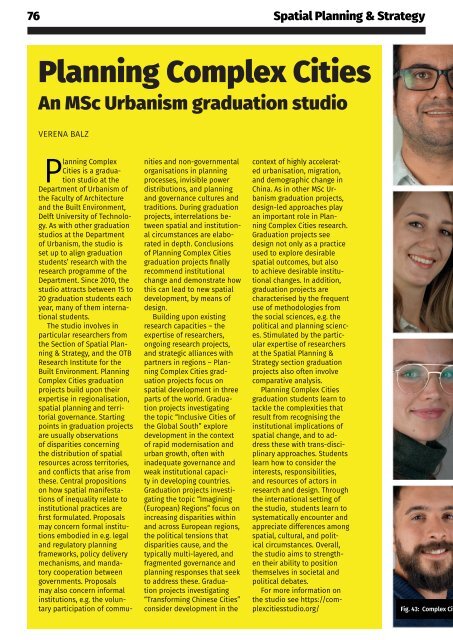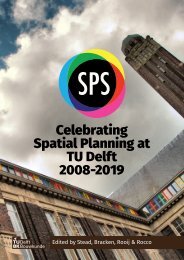*Celebrating Spatial Planning at TU Delft: 2008-2019. Edited by Stead, Bracken, Rooij & Rocco
This is a summary of the achievements of the session Spatial Planning & Strategy of the Department of Urbanism, Faculty of Architecture and the Built Environment, TU Delft, led by Professor Vincent Nadin between 2008 and 2019.
This is a summary of the achievements of the session Spatial Planning & Strategy of the Department of Urbanism, Faculty of Architecture and the Built Environment, TU Delft, led by Professor Vincent Nadin between 2008 and 2019.
Create successful ePaper yourself
Turn your PDF publications into a flip-book with our unique Google optimized e-Paper software.
76 <strong>Sp<strong>at</strong>ial</strong> <strong>Planning</strong> & Str<strong>at</strong>egy<br />
<strong>Planning</strong> Complex Cities<br />
An MSc Urbanism gradu<strong>at</strong>ion studio<br />
VERENA BALZ<br />
<strong>Planning</strong> Complex<br />
Cities is a gradu<strong>at</strong>ion<br />
studio <strong>at</strong> the<br />
Department of Urbanism of<br />
the Faculty of Architecture<br />
and the Built Environment,<br />
<strong>Delft</strong> University of Technology.<br />
As with other gradu<strong>at</strong>ion<br />
studios <strong>at</strong> the Department<br />
of Urbanism, the studio is<br />
set up to align gradu<strong>at</strong>ion<br />
students’ research with the<br />
research programme of the<br />
Department. Since 2010, the<br />
studio <strong>at</strong>tracts between 15 to<br />
20 gradu<strong>at</strong>ion students each<br />
year, many of them intern<strong>at</strong>ional<br />
students.<br />
The studio involves in<br />
particular researchers from<br />
the Section of <strong>Sp<strong>at</strong>ial</strong> <strong>Planning</strong><br />
& Str<strong>at</strong>egy, and the OTB<br />
Research Institute for the<br />
Built Environment. <strong>Planning</strong><br />
Complex Cities gradu<strong>at</strong>ion<br />
projects build upon their<br />
expertise in regionalis<strong>at</strong>ion,<br />
sp<strong>at</strong>ial planning and territorial<br />
governance. Starting<br />
points in gradu<strong>at</strong>ion projects<br />
are usually observ<strong>at</strong>ions<br />
of disparities concerning<br />
the distribution of sp<strong>at</strong>ial<br />
resources across territories,<br />
and conflicts th<strong>at</strong> arise from<br />
these. Central propositions<br />
on how sp<strong>at</strong>ial manifest<strong>at</strong>ions<br />
of inequality rel<strong>at</strong>e to<br />
institutional practices are<br />
first formul<strong>at</strong>ed. Proposals<br />
may concern formal institutions<br />
embodied in e.g. legal<br />
and regul<strong>at</strong>ory planning<br />
frameworks, policy delivery<br />
mechanisms, and mand<strong>at</strong>ory<br />
cooper<strong>at</strong>ion between<br />
governments. Proposals<br />
may also concern informal<br />
institutions, e.g. the voluntary<br />
particip<strong>at</strong>ion of commu-<br />
nities and non-governmental<br />
organis<strong>at</strong>ions in planning<br />
processes, invisible power<br />
distributions, and planning<br />
and governance cultures and<br />
traditions. During gradu<strong>at</strong>ion<br />
projects, interrel<strong>at</strong>ions between<br />
sp<strong>at</strong>ial and institutional<br />
circumstances are elabor<strong>at</strong>ed<br />
in depth. Conclusions<br />
of <strong>Planning</strong> Complex Cities<br />
gradu<strong>at</strong>ion projects finally<br />
recommend institutional<br />
change and demonstr<strong>at</strong>e how<br />
this can lead to new sp<strong>at</strong>ial<br />
development, <strong>by</strong> means of<br />
design.<br />
Building upon existing<br />
research capacities – the<br />
expertise of researchers,<br />
ongoing research projects,<br />
and str<strong>at</strong>egic alliances with<br />
partners in regions – <strong>Planning</strong><br />
Complex Cities gradu<strong>at</strong>ion<br />
projects focus on<br />
sp<strong>at</strong>ial development in three<br />
parts of the world. Gradu<strong>at</strong>ion<br />
projects investig<strong>at</strong>ing<br />
the topic “Inclusive Cities of<br />
the Global South” explore<br />
development in the context<br />
of rapid modernis<strong>at</strong>ion and<br />
urban growth, often with<br />
inadequ<strong>at</strong>e governance and<br />
weak institutional capacity<br />
in developing countries.<br />
Gradu<strong>at</strong>ion projects investig<strong>at</strong>ing<br />
the topic “Imagining<br />
(European) Regions” focus on<br />
increasing disparities within<br />
and across European regions,<br />
the political tensions th<strong>at</strong><br />
disparities cause, and the<br />
typically multi-layered, and<br />
fragmented governance and<br />
planning responses th<strong>at</strong> seek<br />
to address these. Gradu<strong>at</strong>ion<br />
projects investig<strong>at</strong>ing<br />
“Transforming Chinese Cities”<br />
consider development in the<br />
context of highly acceler<strong>at</strong>ed<br />
urbanis<strong>at</strong>ion, migr<strong>at</strong>ion,<br />
and demographic change in<br />
China. As in other MSc Urbanism<br />
gradu<strong>at</strong>ion projects,<br />
design-led approaches play<br />
an important role in <strong>Planning</strong><br />
Complex Cities research.<br />
Gradu<strong>at</strong>ion projects see<br />
design not only as a practice<br />
used to explore desirable<br />
sp<strong>at</strong>ial outcomes, but also<br />
to achieve desirable institutional<br />
changes. In addition,<br />
gradu<strong>at</strong>ion projects are<br />
characterised <strong>by</strong> the frequent<br />
use of methodologies from<br />
the social sciences, e.g. the<br />
political and planning sciences.<br />
Stimul<strong>at</strong>ed <strong>by</strong> the particular<br />
expertise of researchers<br />
<strong>at</strong> the <strong>Sp<strong>at</strong>ial</strong> <strong>Planning</strong> &<br />
Str<strong>at</strong>egy section gradu<strong>at</strong>ion<br />
projects also often involve<br />
compar<strong>at</strong>ive analysis.<br />
<strong>Planning</strong> Complex Cities<br />
gradu<strong>at</strong>ion students learn to<br />
tackle the complexities th<strong>at</strong><br />
result from recognising the<br />
institutional implic<strong>at</strong>ions of<br />
sp<strong>at</strong>ial change, and to address<br />
these with trans-disciplinary<br />
approaches. Students<br />
learn how to consider the<br />
interests, responsibilities,<br />
and resources of actors in<br />
research and design. Through<br />
the intern<strong>at</strong>ional setting of<br />
the studio, students learn to<br />
system<strong>at</strong>ically encounter and<br />
appreci<strong>at</strong>e differences among<br />
sp<strong>at</strong>ial, cultural, and political<br />
circumstances. Overall,<br />
the studio aims to strengthen<br />
their ability to position<br />
themselves in societal and<br />
political deb<strong>at</strong>es.<br />
For more inform<strong>at</strong>ion on<br />
the studio see https://complexcitiesstudio.org/<br />
Fig. 43: Complex Cit




